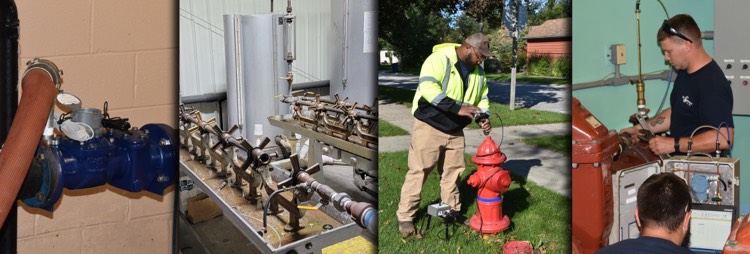Large Meter Testing
We developed our Large Meter Evaluation, Testing, Repair, and Calibration program to help you recover and retain large amounts of potential revenue. Our large meter testing is comprised of three phases:
- Production / Master
- Wholesale (Imported / Exported Water Meters)
- Commercial / Industrial
Meter Evaluation
Our meter data and meter evaluations allow us to locate inconsistencies within your reading and billing cycles and identify accuracy problems due to improper sizing and settings. This helps to develop a cost-effective meter test and repair schedule.
Meter Testing
Our testing is done by comparative methods using a certified test meter or Pitot Rod to test meters in situ.
Meter Repair / Calibration
We will repair and calibrate any meters that are stopped, broken or inaccurate and re-test to be sure the meter meets AWWA standards. We will replace parts like measuring chambers, turbine assemblies, check valves, and registers.
Bench Testing
For meters that are 1 inch and smaller, we offer our bench testing service. Our custom-built, certified bench testing station allows meters to be tested in a controlled environment, producing quick and accurate results. With regular testing of small meter samples, it can assure a utility that their small meter population is running up to AWWA standards.
Meter Evaluation and Testing
Once meters arrive at the meter shop, they are inspected for damage and cataloged. A general notation of condition is noted, consumption readings recorded, and an identification tag attached.
Meter Testing
Testing is done efficiently by installing meters on the meter test bench. Water is slowly flowed to fill the lines of the bench. Each meter is “zeroed” by using bleed-off valves.
RMA Form
Ready for us to test your meters at our facility? Fill out this RMA form and place it in the box along with your meters and we’ll take care of the rest!
Leak Detection
When you’re dealing with water loss issues, we offer a variety of leak detection services to identify leakage in water systems.
Water Distribution System Leak Survey
Our team of experienced technicians use state-of- the-art leak detection technology to survey your water distribution system.
Transmission Main Leak Detections
In order to detect leaks on large transmission mains, our expert technicians use Echologics® EchoShore-M® leak location system. By using this non-invasive technique, it allows us to locate leaks in various flow conditions which can result in water loss reduction and cost savings.
Multi-Sensor Leak Detection
We’re proud to announce that M.E. Simpson Co., Inc. has teamed up with Electro Scan, Inc. and Electro Scan (UK) Ltd. on the development of Multi-Sensor Leak Detection using Electro Scan (FELL). This new multi-sensor, machine-intelligent pressurized potable water pipe inspection features patented low voltage conductivity technology and will be available in summer 2021 in the United States.
This new pipe condition assessment solution includes the company’s flagship low voltage conductivity sensor. This sensor is capable of detecting pipe defects contributing to leaks within 1 cm of horizontal accuracy while simultaneously estimating defect leakage rates in gallons per minute (GPM). The ground-breaking inspection platform also includes in-pipe tethered acoustic sensor technology to listen for leaks and a high-resolution closed-circuit television.
Electro Scan’s multi-sensor approach saves utility owners on leak detection costs by providing three data sets per pipe insertion. This allows water managers to more quickly focus on the highest value leaks to repair, reducing overall system losses.
Pipe inspection low voltage conductivity technology developed by Electro Scan was included in the American Water Works Association’s First Edition Water Supply Manual of Practice. It was the only technology listed to perform leak detection for Cured-In-Place Pipe (CIPP), and for trenchless in situ resin linings for water mains.
Water Audits
In order to assist your water utility in improving accountability and optimizing your distribution system’s operational performance, M.E. Simpson Co., Inc. has developed a six-phase plan to audit your water utility’s specific set of needs.
Water Supplied Analysis
Analysis of water supply inputs include water from your own sources, water imported, and water exported. Production master meters will be evaluated and tested per AWWA best practices using our very own Polcon® Pitot Rod along with our Polcon® Sentry electronic flow recorder.
Development of Viable Water Loss Control Plans
Once the performance indicators are interpreted, it allows for the development of water loss controls that can be implemented by the utility to correct the losses. The controls are prioritized by short-term immediate returns to long-term planning for larger scale programs. The frequency of meter testing and leak detection programs is then detailed based on revenue loss recovery and helping utilities meet regulatory agency requirements for accountability.
Apparent Loss Calculations
Conducting a review of current policies and practices regarding unauthorized water uses, meter testing, meter changeouts, meter right sizing, and practices of corrections for billing/accounting of water use errors.
Real Loss Calculations
Calculating leakage losses to identify leak detection strategies in order to help locate and control losses.
Development of Performance Indicators
Once all the data has been entered into the audit, we calculate the performance indicators. These indicators will be used to help with the determination of overall water losses.
Authorized Consumption Analysis
A review of consumption records will be conducted that includes the four areas of authorized water uses:
- Billed metered water
- Billed unmetered water
- Unbilled metered water
- Unbilled unmetered water
To learn more about the importance of water audits and water loss control, take a look at our AWWA Essential Knowledge Briefing by clicking here.
Water Audit Validation
Our team of certified water audit validators conduct Level 1 water audit validations. They are specially trained to analyze water audits for potential errors prior to audits being submitted to state regulatory agencies.
